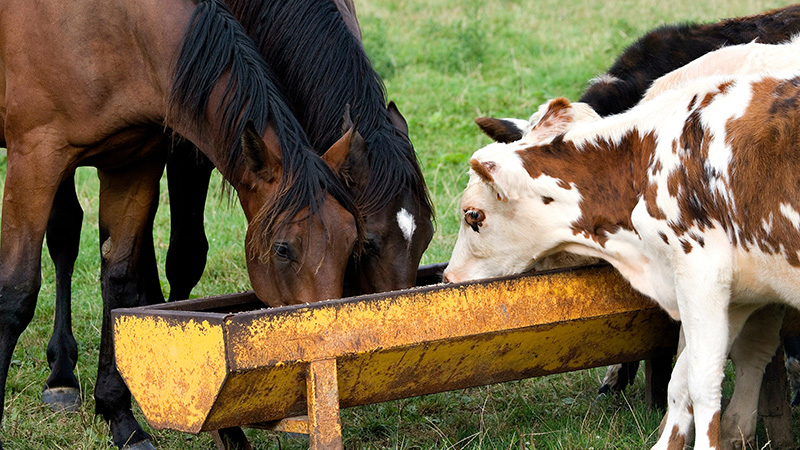
Iononophores that are included in some cattle feeds can be deadly if consumed by horses. Credit: Adobe Stock 371264104
A recent report of 70 horse deaths serves as a devastating reminder to ensure that horses are fed only feeds specifically manufactured for equine consumption. The incident, which occurred on a single ranch in Oklahoma, occurred as a result of accidental feed contamination at the feed mill where the feed was produced.
The drug, monensin, is in a class of antibiotic medications called ionophores, which are commonly fed to cattle, small ruminants, and poultry to promote growth and control coccidiosis. Other ionophores include lasalocid and salinomycin. Horses are exquisitely sensitive to all types of ionophores, and consuming even tiny amounts can result in heart failure, neurologic disease, and death. Clinical signs in affected horses include depression, colic, incoordination, and collapse. Diarrhea and excessive sweating are also commonly observed. There are no specific treatments or antidotes for ionophore toxicity in horses. Veterinarians can administer supportive care to affected horses (pain management, fluids) and may attempt to remove any remaining contaminated feed from the stomach, if within a few hours of ingestion. Most horses with ionophore toxicity die, and those that survive often have long term heart disease. Camelids (Camels, llamas, and alpacas) are also very sensitive to ionophores and also should never be fed feed intended for cattle or poultry.
Recommendations to prevent ionophore poisoning in horses include never feeding grains or feedstuffs intended for cattle, small ruminants, or poultry to horses. While the FDA has safety guidelines for feed mills producing both ruminant and equine feeds regarding cleaning of equipment between batches, purchasing equine feeds produced in facilities that also process cattle feeds is a risk and likely contributed to the current situation in Oklahoma. To prevent such accidental feed contamination, horse owners are encouraged to feed commercial equine feeds or feeds produced in feed mills that only process equine feeds (or feed mills that don’t use ionophores of any kind).
–
Recent news articles with further information:
Monensin and Lasalocid Toxicity in Horses
Paulick Report: Dozens Of Rodeo Horses Die After Possible Monensin Feed Contamination
High Plains Journal: Nearly 70 horses die after eating feed contaminated with monensin
- Livestock Owners are Encouraged to be on the Lookout for New World Screwworm in the Wake of Outbreaks in Central America - March 21, 2025
- Horse Feed and Cattle Feed Don’t Mix: 70 Horses Die After Ingesting Feed Contaminated with Monensin - September 6, 2024
- Don’t Let Your Horse Get Stricken by Strangles - March 8, 2024
